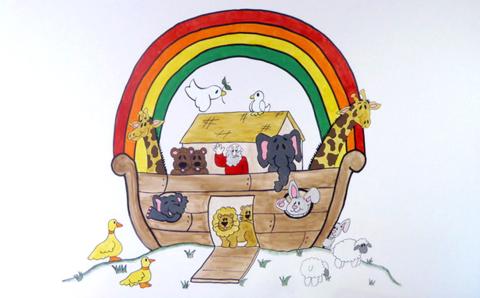Years ago, during a canoe trip on a Michigan river, I stepped into what appeared to be shallow water to pull the canoe to shore. But the water was over my head. Instantly I was disoriented, grasping for anything to provide stability. I finally reached the shore, but not without a major scare.
At age 44, another experience changed me in an instant. Years later, I am still clutching for solid ground. On that warm summer day, I finished my work at a large corporation where I oversaw the real estate area of the legal department while also working on 20-plus transactions. Often while driving, I would recite Romans 1-8, but that day a personnel issue at work distracted me.
After supper, my wife, Kori, and I took our dogs for a walk. We decided to postpone a family camping trip because we were too busy. Back home I joined our three sons for a video and ice cream. While seated, I fell to my side. Disoriented, I tried to get up but crashed into furniture and fell to the floor, ice cream dripping from my face. As Kori rushed into the room and helped me up from the floor I thought, I’m going to die.
Things calmed down before an ambulance arrived. Although I could answer questions and follow commands, I was taken to the hospital as a precaution. Some of the symptoms returned, but the doctor assured us it was not a stroke and encouraged Kori to go home. I emailed my employer to let them know what had happened and then rested. A few hours later, a nurse called out, “He’s having a stroke!”
I spent 15 days in the intensive care unit and underwent two surgeries, including the removal of half of my skull when my brain swelled dangerously fast. After the craniectomy, the physician’s assistant told Kori that if I survived the massive stroke, I would not be on the “weeks or months recovery plan” but on the “years plan,” suggesting a long road ahead.
The physician’s assistant was right. The changes caused by my stroke were instantaneous and difficult for me, for Kori, and for our four children, then ages 9 through 14. Our family would never be the same.
Before, I was strong. After, I was weak. Before, I’d negotiated a 30-page contract on the phone while driving home. Since my stroke, I’ve struggled with simple cognitive tasks and have not yet been cleared to drive. Before, I ran three or four miles and biked 20 miles on a whim. Learning to walk with a cane and ride an adaptive bike have been slow processes.
Before, I was able to help others financially. Now I receive help from others. Before, the future felt like hiking the crest of a mountain trail with a clear view of the many possibilities ahead. After, it’s like being thrown into a pit without a view.
Before, I knew God’s promise in Romans 8:28 to work all things for “the good of those who love him.” Now my focus is that the promise is for those “who have been called according to his purpose.” Since God’s purpose is his glory (Isa. 42:8), terrible circumstances work for good if God is glorified through them. I’d rather glorify God in strength, good health, exceptional abilities, and financial stability, but through my struggles, I’m beginning to learn that this is not always God’s way.
I’m learning that God is glorified through my weakness (2 Cor. 12:9). God is glorified when our church family surrounds our family with encouragement, love, and prayers (Gal. 6:10) and when others see their good works and praise God (Matt. 5:16). God is glorified when I praise God for pulling me out of the pit (Ps. 40:2).
I’m struggling to try to grasp these truths daily while still living with grief. It is not how I wanted to learn. I’m beginning to understand that Romans 8:28 is not a promise of a “happily ever after” in this life. But it assures us that even in the worst circumstances, God provides opportunities to glorify him.
We Are Not Alone
July 17, 2014, was the last day Glen went to work; the last day he drove a car; the last day we were able to walk hand in hand; the last day our four kids had a “normal” family life with a dad who could run around and play with them, drive them places, and engage with them at their level. It was the last day of true independence for Glen—and in some ways, for all of us.
As a family, we are no longer free to do all of the things that we used to love to do together—Sunday hikes at Saugatuck State Park, backpacking in the mountains, Ultimate Frisbee and baseball in the park, trips to Indiana or wherever we wanted to go, whenever we wanted to go. I keep thinking that this date won't bother me so much as the years go on, but it does. I miss what we once had every single day. I know Glen and the kids do too.
But I can honestly say, as we reflect on these past four years, I have taken much comfort in understanding that God is sovereign and ever-present. God wasn’t absent when we were in the emergency room on July 17, 2014; he went there ahead of us. God wasn’t absent when Glen was fighting for his life; he was fighting for him. God wasn’t absent when the kids cried themselves to sleep for over a year straight; God wept with us. Every single night that year, our son Caleb’s prayer was the same: “Thank you that you are always with us.” That simple prayer was my comfort for that first year, and it still is. We are not alone.
Besides being with us, God has continued to place people in our lives to encourage us, to help us when we have needed it and sometimes to cry with us. God has provided moments of laughter that we could never have imagined—when a person is missing 40 percent of his brain, sometimes strange things happen. Our church, part of the church, continues to uphold us, and for that we are grateful.
During this whole process, Glen never gives up. He still keeps doing occupational therapy and physical therapy. He still keeps doing cognitive exercises and continues to try to relearn things that he hasn’t done since before his stroke—such as riding an adaptive bike purchased with funds raised by two South Christian High students.
We thank the Lord for the prayers, love, and care of so many special people along this emotional journey. I encourage you to uphold in prayer and support the many people in the community where you live who have had a stroke or a traumatic brain injury.
Note: This sidebar is adapted from a CaringBridge post written by Kori VanderKooi.
About the Author
Glen VanderKooi, his wife, Kori, and their children live in Byron Center, Mich., and are members of Heritage CRC.






